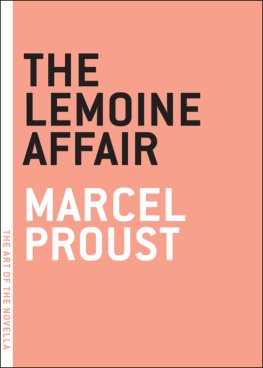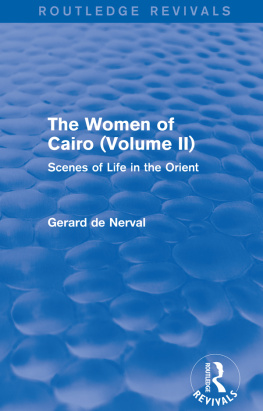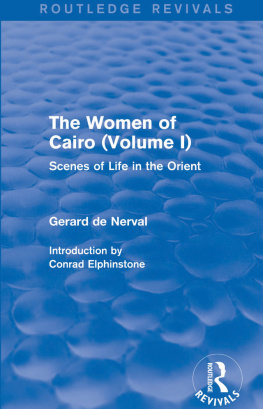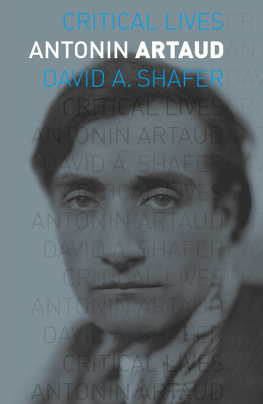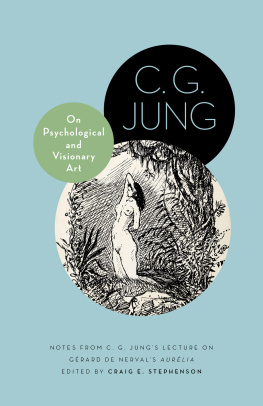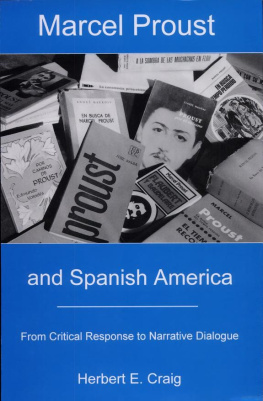
GERARD DE NERVAL: SELECTED WRITINGS
GERARD DE NERVAL was born Grard Labrunie in 1808, in Paris, the son of an army doctor. Two years after his birth his mother died while accompanying her husbands regiment in Germany, and he was placed in the care of relatives in the Valois. In 1814 he took up residence with his father in Paris. A precocious poet, he published a number of volumes of political verse during his adolescence and gained fame at the age of nineteen for his translation of Goethes Faust. In 1830, together with his former schoolmate Thophile Gautier, he joined the ranks of the younger Romantics gathered around Victor Hugo. Having come into a small fortune in 1834, Grard (as he was known) proceeded to squander his inheritance on an ill-fated theatre magazine venture. Forced to turn to hack journalism to cover his growing debts, he also served for a time as a ghost-writer for Alexandre Dumas. The two collaborated on a number of plays, only one of which (Lo Burckart) appeared under the signature of Grard. Like all of his subsequent attempts to conquer the Parisian stage, the play folded after a few performances.
In early 1841, Grard suffered a complete mental breakdown the first appearance of the madness that would plague him on and off for the next fourteen years. Hospitalized for nine months, he wrote most of the visionary sonnets later published under the title The Chimeras. During his delirium he also worked out the fantastic genealogy that justified his nom de plume: Grard de Nerval, descendant of the Roman emperor Nerva and bastard son of Joseph Bonaparte. Nerval spent the year 1843 travelling throughout the Middle East a journey that was in part a voyage of convalescence, in part a further venture into the archetypal universe of Dream that he had discovered during this first descent into insanity. Journey to the Orient (1851), Nervals semi-fictional narrative of his adventures in Egypt, Lebanon and Turkey, consolidated his reputation as one of the foremost travel writers of his generation.
Between 1852 and 1855, in a state of ever-mounting financial and mental disarray, Nerval published the bulk of the work on which his fame rests: The Illuminati (a portrait gallery of Enlightenment mystics and eccentrics), October Nights (a satire of Dickensian realism), Castles in Bohemia (a memoir of his youth) and, most significantly, The Daughters of Fire (a collection of short stories which included his masterpiece Sylvie as well as the sonnets of The Chimeras). During these final years of his life, committed to a sanatorium in Passy under the care of the alienist mile Blanche, Nerval also began work on Aurlia, an autobiography of his madness which he envisaged as a modern version of Dantes Vita Nuova. Having gained his release from Dr Blanches custody, Nerval spent his remaining days working on his spiritual testament, leading an increasingly vagrant existence in Paris. The first portion of Aurlia was published in the presitigious Revue de Paris on 1 January 1855. Later that month, on the morning of 26 January, its author was found hanged in the rue de la Vieille-Lanterne.
RICHARD SIEBURTH teaches French and Comparative Literature at New York University. His previous translations include Friedrich Hlderlins Hymns and Fragments, Walter Benjamins Moscow Diary, Michel Leriss Nights as Day, as well as texts by Blanchot, Michaux, Artaud and Roubaud. He is also the author of Instigations: Ezra Pound and Rmy de Gourmont and editor of Pounds Walking Tour in Southern France. He is currently preparing a translation of Maurice Scves Dlie.
GERARD DE NERVAL
Selected Writings
Translated and with an Introduction and Notes by
RICHARD SIEBURTH
PENGUIN BOOKS
PENGUIN BOOKS
Published by the Penguin Group
Penguin Books Ltd, 27 Wrights Lane, London W8 5TZ , England
Penguin Putnam Inc., 375 Hudson Street, New York, New York 10014, USA
Penguin Books Australia Ltd, Ringwood, Victoria, Australia
Penguin Books Canada Ltd, 10 Alcorn Avenue, Toronto, Ontario, Canada, M4V 3B2
Penguin Books (NZ) Ltd, Private Bag 102902, NSMC, Auckland, New Zealand
Penguin Books Ltd, Registered Offices: Harmondsworth, Middlesex, England
Published in Penguin Classics 1999
All rights reserved
The moral right of the translator has been asserted
Except in the United States of America, this book is sold subject to the condition that it shall not, by way of trade or otherwise, be lent, re-sold, hired out, or otherwise circulated without the publishers prior consent in any form of binding or cover other than that in which it is published and without a similar condition including this condition being imposed on the subsequent purchaser
ISBN: 978-0-14-196661-8
INTRODUCTION
Charles Baudelaire observed that he was one of the few authors of his age who had successfully managed, even in death, to remain forever lucid. Marcel Proust ranked him among the three or four greatest writers of the nineteenth century, singling out his novella Sylvie as a crucial inspiration for his own explorations of time lost and regained. Andr Breton declared him a precursor of surrealism, while Antonin Artaud placed him in the same visionary company as Hlderlin, Nietzsche and Van Gogh. For most English-speaking readers, however, Grard de Nerval still remains a relative cipher, a name perhaps associated with a stray alexandrine at the close of Eliots Waste Land (Le Prince dAquitaine la tour abolie) or else vaguely remembered, via Arthur Symonss influential Symbolist Movement in Literature, as the amiable eccentric who walked live lobsters on blue ribbons through the streets of Paris before eventually succumbing to madness and hanging himself one cold winter evening in the rue de la Vieille-Lanterne.
His friend Thophile Gautier remarked of him, Grard seemed to take pleasure in disappearing from himself, in vanishing from his work, in leading his readers astray. If Nervals tactics of invisibility rendered him elusive to many of his mid-nineteenth-century contemporaries, the particular scope of his accomplishment has all the more continued to evade full-scale English translation. One of the reasons for this no doubt lies in the fact that so many of his writings which fill three substantial tomes in their most recent Pliade edition escape classification by standard literary genre and thereby seem to resist the canonical shape or weight accorded to classics. Though he tried his hand at the novel, Nervals fictions have none of the girth or stamina of his more celebrated contemporaries Balzac, Stendhal, Hugo, Sue, Dumas. His single play of note, set among secret student revolutionary societies in Germany, has fallen into the same oblivion reserved for most of the repertoire of the French romantic stage. Compared to Hugo, Baudelaire or even Mallarm, the body of his major poetry is slight indeed: his Chimeras reinvent the French sonnet in a mere 168 lines.
The minor or marginal modes in which Nerval excelled the short story or novella, the biographical sketch, the essay or travel reportage, the brief vignette or reminiscence, the literary letter or memoir are inextricably bound up with the newspaper and magazine culture of his day. Forced, after squandering his inheritance, to support himself as a professional journalist and man of letters, he acquired a certain celebrity as a critic and feuilletoniste during the July Monarchy; indeed, the light humorous touch of many of his pieces earned him the unlikely sobriquet of le Sterne franais. But while actively disseminating his texts in the periodical press, Nerval remained for much of his career an author without an actual opus, a literary personality without an oeuvre, for with the exception of his teenage translation of
Next page

